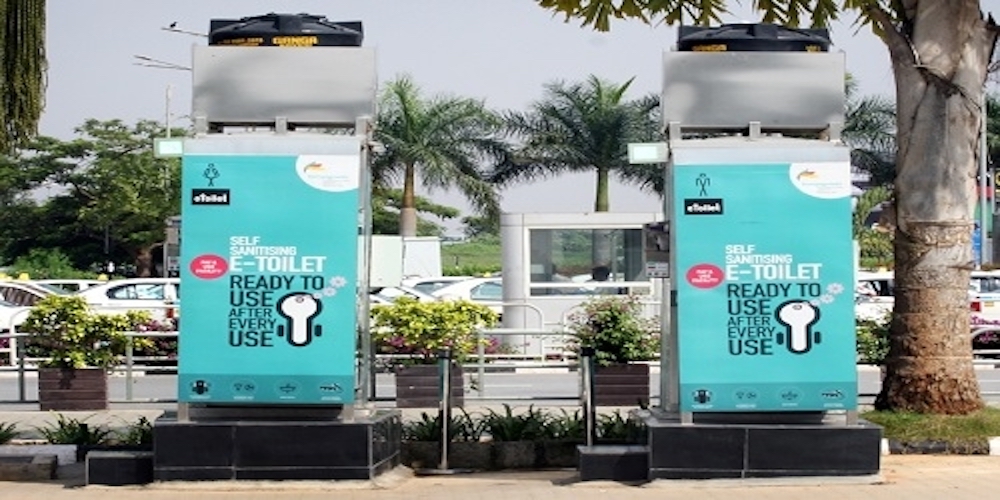Smart e-Toilets

Powered by Swachh Bharat Mission, tech-driven toilets are now elevating public hygiene and convenience in Urban India
Hyderabad has added its own unique twist to the smart toilet revolution with the creation of Loo-cafes. These innovative facilities combine a public toilet and a café, providing not only a place for people to freshen up but also a relaxing environment to grab a bite. The washroom is located at the back, with a café in front, making it a convenient solution for people on the move. Aesthetically appealing and designed to be luxurious, Loocafes invite people to experience public sanitation in a completely new way, combining comfort with utility.
Maharashtra’s Pimpri Chinchwad has followed suit, constructing aspirational toilets at 26 locations across the city through a Public-Private Partnership (PPP) model. These smart toilets are equipped with modern amenities and electronic systems that simplify maintenance and enhance usability. With features such as automatic flushing activated by the opening of the door, separate rooms for men and women, voice assistants, power backup, and automated flushing sensors, these facilities set a new benchmark for public sanitation.
In Nagpur, smart e-toilets in distinct pink and blue colours for women and men reflect a focus on gender-sensitive infrastructure. These facilities are equipped with automatic flushing, are disinfected by EV rays, and operate with coin-based access, ensuring hygiene and accessibility. Puri’s Malatipatpur bus stand has taken things a step further with AI-based smart toilets, which feature UV lights to ensure virus- and bacteria-free environments. This pay-to-use facility is among the first of its kind in Eastern India, setting a new standard for sanitation technology in the region.
Other cities, such as Thiruvananthapuram, have installed smart e-toilets like the Smart She Toilet at its zoo, offering much-needed convenience for families and mothers with young children. These facilities are unmanned, prefabricated with steel, and come with modern conveniences like a sanitary napkin vending machine, incinerator, baby feeding station, and more.

All the above examples across India highlight how smart e-toilets are reshaping the public sanitation landscape, ensuring hygiene, safety, and comfort. Whether through Pimpri Chinchwad’s aspirational toilets, Hyderabad’s Loocafes, or AI-based innovations in Puri, the future of urban sanitation is both smart and inclusive.
These initiatives reflect a new era in public infrastructure, where advanced technology meets the everyday needs of urban populations, ensuring that sanitation facilities are not only functional but also a source of pride and convenience.
It may be noted that to accelerate the efforts to achieve universal sanitation coverage and to put the focus on sanitation, Prime Minister Narendra Modi had launched the Swachh Bharat Mission on 2nd October 2014. Under the mission, all villages, Gram Panchayats, Districts, States and Union Territories in India declared themselves “open-defecation free” (ODF) by 2 October 2019, the 150th birth anniversary of Mahatma Gandhi, by constructing over 100 million toilets in rural India.
To ensure that the open defecation free behaviours are sustained, no one is left behind, and that solid and liquid waste management facilities are accessible, the Mission is moving towards the next Phase II of SBMG i.e ODF-Plus. ODF Plus activities under Phase II of Swachh Bharat Mission (Grameen) will reinforce ODF behaviours and focus on providing interventions for the safe management of solid and liquid waste in villages.
The Swachh Bharat Mission (Gramin) launched on 2nd October, 2014, by modifying the erstwhile Nirmal Bharat Abhiyan (NBA), is a community-led and people-oriented program aimed at universalizing safe sanitation.
Swachh Bharat Mission (Gramin) is the only sanitation programme implemented by the Ministry of Drinking Water and Sanitation (now Ministry of Jal Shakti).
Financial support of Rs – 12,000 for APL and BPL Rural households including storage for handwashing and cleaning of the toilet
Payment of incentives may be in cash or in the form of construction materials or credit vouchers for such materials.
Activities under the Scheme
• Construction of Individual Household Latrines (IHHL)
• Construction of Community Sanitary Complexes (CSCs)
• Solid Liquid Waste Management (SLWM) activities
• Information, Education and Communication (IEC)
• Human Resource Development (HRD) activities


